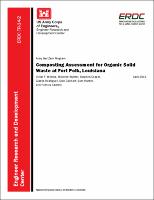Please use this identifier to cite or link to this item:
https://hdl.handle.net/11681/8580| Title: | Composting assessment for organic solid waste at Fort Polk, Louisiana |
| Authors: | Construction Engineering Research Laboratory (U.S.) Fort Polk (La.). Department of Public Works Medina, Victor F. Wynter, Michelle T. Cosper, Stephen D. Rodriguez, Giselle Gebhart, Dick L. Hunter, Samuel L. Kemme, Patricia A. |
| Keywords: | Composting Fort Polk (La.) Net zero waste Organic solid waste Waste Waste diversion |
| Publisher: | Environmental Laboratory (U.S.) Engineer Research and Development Center (U.S.) |
| Series/Report no.: | ERDC TR ; 14-2. |
| Description: | Technical Report Abstract: A study was conducted to evaluate composting as a means of increasing waste diversion at Ft. Polk, LA. Wastes were evaluated from a range of activities, and the authors found that a number of materials currently landfilled are suitable for composting, including: vegetation, food wastes, pulverized paper (which is not suitable for recycling), consumer contaminated paper (not suitable for recycling), damaged wood pallets, and sludge from the wastewater treatment plants. Waste records from Ft. Polk suggest a composting operation producing at least 2200 tons per year (from a food waste/vegetation strategy) is feasible. This would represent considerable solid waste diversion, consistent with meeting Net Zero Waste Goals. Between the Integrated Training Area Management (ITAM), the Directorate for Family, Morale, Welfare, and Recreation (DFMWR) (golf course, athletic and drill fields) and smaller users, there are enough users to consume all the compost that could be generated from an on-site operation. A suitable area for on-site composting is available. There are also other alternatives to on-site composting, including current management, other means of waste diversion (including direct soil application of certain waste materials and anaerobic digestion of food wastes), and developing partnerships with composting facilities offsite. Although this project is focused on Ft. Polk, the assessment could be — in a broad sense — applicable to other Army installations. In addition, the issues found at the Joint Training and Readiness Center (JTRC) might have applicability to contingency environments and deployed operations. |
| Rights: | Approved for public release; distribution is unlimited. |
| URI: | http://hdl.handle.net/11681/8580 |
| Appears in Collections: | Technical Report |
Files in This Item:
| File | Description | Size | Format | |
|---|---|---|---|---|
| ERDC-TR-14-2.pdf | 9.49 MB | Adobe PDF |  View/Open |